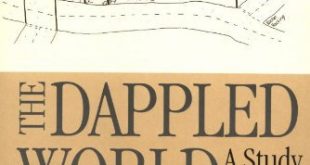[embedded content] Ja hur ska man reagera på dessa uttryck för oförblommerat svinaktig rasism? Kanske med att lyssna på Olof Palme [embedded content]
Read More »Why economists can’t reason
Why economists can’t reason Reasoning is the process whereby we get from old truths to new truths, from the known to the unknown, from the accepted to the debatable … If the reasoning starts on firm ground, and if it is itself sound, then it will lead to a conclusion which we must accept, though previously, perhaps, we had not thought we should. And those are the conditions that a good argument must meet; true premises and a good inference. If either of...
Read More »Goodbye Lenin!
[embedded content]
Read More »How do we attach probabilities to the real world?
How do we attach probabilities to the real world? Econometricians usually think that the data generating process (DGP) always can be modelled properly using a probability measure. The argument is standardly based on the assumption that the right sampling procedure ensures there will always be an appropriate probability measure. But – as always – one really has to argue the case, and present warranted evidence that real-world features are correctly described...
Read More »Küssen kann man nicht alleine
Küssen kann man nicht alleine [embedded content]
Read More »Ich hab’ mein Herz in Heidelberg verloren (personal)
Ich hab’ mein Herz in Heidelberg verloren (personal)
Read More »On probability distributions and uncertainty
On probability distributions and uncertainty Almost a hundred years after John Maynard Keynes wrote his seminal A Treatise on Probability (1921), it is still very difficult to find economics textbooks that seriously try to incorporate his far-reaching and incisive analysis of induction and evidential weight. The standard view in mainstream economics – and the axiomatic probability theory underlying it – is to a large extent based on the rather simplistic...
Read More »Economics for everyone
[embedded content]
Read More »What is ‘effective demand’?
Economists of all shades have generally misunderstood the theoretical structure of Keynes’s The General Theory. Quite often this is a result of misunderstanding the concept of ‘effective demand’ — one of the key theoretical innovations of The General Theory. Jesper Jespersen untangles the concept and shows how Keynes, by taking uncertainty seriously, contributed to forming an analytical alternative to the prevailing neoclassical general equilibrium framework: Effective demand...
Read More »The invisible hand — invisible because it’s not there
The invisible hand — invisible because it’s not there Daniel Kahneman … has demonstrated how individuals systematically behave in ways less rational than orthodox economists believe they do. His research shows not only that individuals sometimes act differently than standard economic theories predict, but that they do so regularly, systematically, and in ways that can be understood and interpreted through alternative hypotheses, competing with those...
Read More » Lars P. Syll
Lars P. Syll






